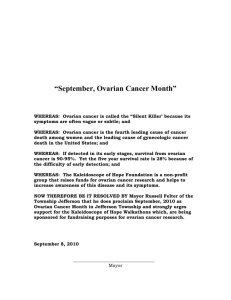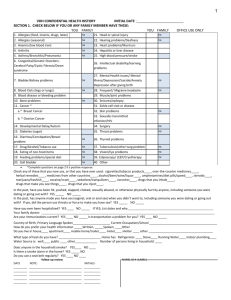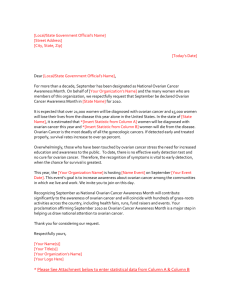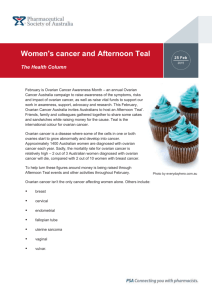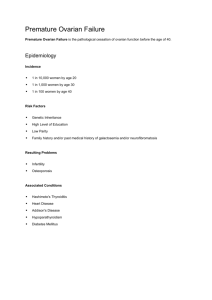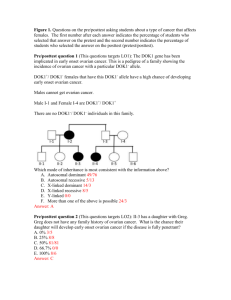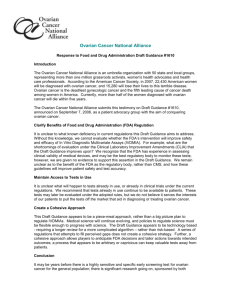New Ovarian Cancer PSA Features President Barack Obama's
advertisement
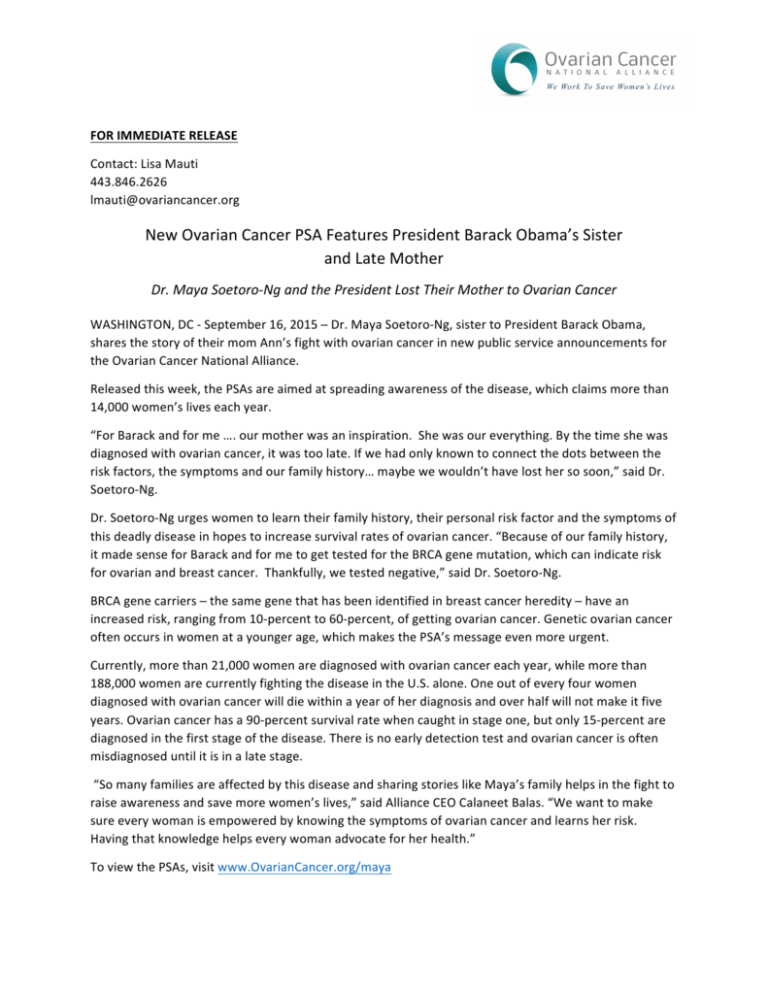
FOR IMMEDIATE RELEASE Contact: Lisa Mauti 443.846.2626 lmauti@ovariancancer.org New Ovarian Cancer PSA Features President Barack Obama’s Sister and Late Mother Dr. Maya Soetoro-­‐Ng and the President Lost Their Mother to Ovarian Cancer WASHINGTON, DC -­‐ September 16, 2015 ─ Dr. Maya Soetoro-­‐Ng, sister to President Barack Obama, shares the story of their mom Ann’s fight with ovarian cancer in new public service announcements for the Ovarian Cancer National Alliance. Released this week, the PSAs are aimed at spreading awareness of the disease, which claims more than 14,000 women’s lives each year. “For Barack and for me …. our mother was an inspiration. She was our everything. By the time she was diagnosed with ovarian cancer, it was too late. If we had only known to connect the dots between the risk factors, the symptoms and our family history… maybe we wouldn’t have lost her so soon,” said Dr. Soetoro-­‐Ng. Dr. Soetoro-­‐Ng urges women to learn their family history, their personal risk factor and the symptoms of this deadly disease in hopes to increase survival rates of ovarian cancer. “Because of our family history, it made sense for Barack and for me to get tested for the BRCA gene mutation, which can indicate risk for ovarian and breast cancer. Thankfully, we tested negative,” said Dr. Soetoro-­‐Ng. BRCA gene carriers ─ the same gene that has been identified in breast cancer heredity ─ have an increased risk, ranging from 10-­‐percent to 60-­‐percent, of getting ovarian cancer. Genetic ovarian cancer often occurs in women at a younger age, which makes the PSA’s message even more urgent. Currently, more than 21,000 women are diagnosed with ovarian cancer each year, while more than 188,000 women are currently fighting the disease in the U.S. alone. One out of every four women diagnosed with ovarian cancer will die within a year of her diagnosis and over half will not make it five years. Ovarian cancer has a 90-­‐percent survival rate when caught in stage one, but only 15-­‐percent are diagnosed in the first stage of the disease. There is no early detection test and ovarian cancer is often misdiagnosed until it is in a late stage. “So many families are affected by this disease and sharing stories like Maya’s family helps in the fight to raise awareness and save more women’s lives,” said Alliance CEO Calaneet Balas. “We want to make sure every woman is empowered by knowing the symptoms of ovarian cancer and learns her risk. Having that knowledge helps every woman advocate for her health.” To view the PSAs, visit www.OvarianCancer.org/maya 30-­‐second PSA Script: “Each year, we lose fourteen thousand granddaughters and grandmothers. Daughters, mothers, and sisters to ovarian cancer. That’s how Barack and I lost our mom. It affects women at any age and there’s no early detection test. Knowing the symptoms … and your family history is the key to understanding your risk. If caught early, it is beatable. Learn more. Learn … from what happened to our mother … and so many like her.” Two-­‐minute PSA Script: “More than fourteen thousand grandmothers and granddaughters. Mothers, daughters and sisters… lose the battle with ovarian cancer each year. That’s how Barack and I lost our mom, Ann. She was living a vibrant life … still traveling the world … just beginning a project to help women in poverty be more self-­‐sufficient. She was an inspiration… she was our everything and losing her was devastating. When her symptoms started, she was misdiagnosed. By the time they realized it was ovarian cancer, it was too late and she was in a late stage. Ovarian cancer moves so quickly … and unlike breast cancer… people don’t know about it. There is less research and no early detection test. We never thought we’d lose her that fast, but we now understand how we did. Barack and I are trying to change that for other families. Here’s what you need to know. Knowledge of symptoms and family risk is the best defense against ovarian cancer. Learn your risk and then tell everyone you know to learn theirs. Because of our family history, it made sense for Barack and for me to get tested for the B-­‐R-­‐C-­‐A gene mutation, which can indicate risk for ovarian and breast cancer. Thankfully, we tested negative. You need to know that ovarian cancer can affect women at any age, and if the symptoms occur more than twelve times – in the course of one month – see your doctor. Twenty-­‐one thousand are diagnosed each year. One out of every four will die within a year of her diagnosis. And more than half of those women won’t survive five years. Unlike other cancers – survival rates for ovarian cancer over the past 40 years have not improved. Learn the symptoms. Learn your risk. Go to ovariancancer.org today and share what you learn with others. This is our chance to save more women’s lives who are like our mom -­‐ so many moms, daughters, sisters, and grandmothers.” Dr. Maya Soetoro-­‐Ng is the Assistant Faculty Specialist at the Matsunaga Institute for Peace & Conflict Resolution, which is based in the College of Social Sciences at the University of Hawaii at Manoa. # # # The Ovarian Cancer National Alliance (OCNA) is a powerful voice for everyone touched by ovarian cancer, connecting survivors, women at risk, caregivers and health providers with the information and resources they need. OCNA ensures that ovarian cancer is a priority for lawmakers and agencies in Washington, D.C., and throughout the country. OCNA works with the community to raise their voices on behalf of every life affected by this disease.
